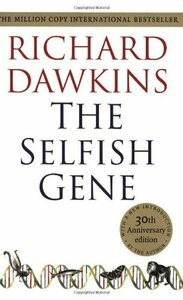Take a photo of a barcode or cover
The Selfish Gene by Richard Dawkins is a groundbreaking and insightful book that explores the evolution of life from a novel perspective. Through his brilliant writing and logical arguments, Dawkins posits that genes are the driving force behind evolution, not individuals or species. He argues that genes strive for survival and replication, and that this results in the development of complex organisms and behaviors that are advantageous for their survival. The book provides a thought-provoking and empowering view of life, and has been widely celebrated for its contribution to our understanding of evolution and its impact on modern biology and society. It is a must-read for anyone interested in science, biology, and the nature of life itself.
Pretty good. Reading it in 2023 I felt like a lot of the information was stuff I already learned in school though. I'm sure it was groundbreaking at the time it came out though.
informative
reflective
medium-paced
challenging
informative
reflective
I think after reading this book, I am able to understand and move on rather than getting stressed
Really accessible but goes into meaningful depth for lots of scenarios, both via thought experiments and real world examples/data.
The version I had includes footnotes written years after the first publication. They correct previous mistakes, give context to the time passages were written, and follow up earlier theories with real experimental data and observation that had happened after the first publication. Really great having those.
The version I had includes footnotes written years after the first publication. They correct previous mistakes, give context to the time passages were written, and follow up earlier theories with real experimental data and observation that had happened after the first publication. Really great having those.
Really ingenious concept: that we can, for the purposes of scientific explanation, see humans as individual machines for the replication of individual 'selfish' genes. Dawkins puts the idea to brilliant scientific use in explaining many features of animal and human behaviour patterns, and also to quasi-philosophical use, especially regarding iterative prisoner's dilemmas (a fantastic chapter, worth reading on its own), and memes as units of cultural inheritance.
Still, I came away with worries about how Dawkins takes this notion to relate to e.g. the philosophy of mind, and ethics: it is by no means simple or obvious or uncontroversial to make claims such as he makes, that in one sense we are determined by our genes, yet in another we can somehow 'escape' their 'tyranny' over us or 'disobey' the pressures they exert. Interpreted unsympathetically, Dawkins is just incoherent - but even for a sympathetic reader, more needs to be said, and Dawkins should not dispel such worries so glibly in his footnotes, even if he is not to be the person who resolves these issues....
Still, I came away with worries about how Dawkins takes this notion to relate to e.g. the philosophy of mind, and ethics: it is by no means simple or obvious or uncontroversial to make claims such as he makes, that in one sense we are determined by our genes, yet in another we can somehow 'escape' their 'tyranny' over us or 'disobey' the pressures they exert. Interpreted unsympathetically, Dawkins is just incoherent - but even for a sympathetic reader, more needs to be said, and Dawkins should not dispel such worries so glibly in his footnotes, even if he is not to be the person who resolves these issues....
challenging
informative
slow-paced
informative
slow-paced
challenging
informative
reflective
medium-paced
A thorough and well-argued way for the layperson to deepen their understanding of evolution. Dawkins works his way through a number of different scenarios to make the case for the gene being the fundamental unit of evolution and for cases of seeming altruism in nature actually representing selfishness on the part of the gene. While nominally a book on biology, it contains a significant amount of math and especially game theory, which put some logic and structure to the complexity of the natural world.
Dawkins does a superb job of making the book approachable for layperson. Most of the complex concepts that he covers come with a relatable metaphor, though he is always careful to remind the reader that they are just that, metaphors, especially when they break down in some respect. He is also remarkably adept at anticipating reader questions or skepticism. There were several times where I found myself thinking "Wait, isn't he begging the question here?", only to have him say within a page or two something like "Some might say that this line of reasoning drifts dangerously close to begging the question... But here's why it doesn't".
A couple of minor complaints:
1) The updated edition of the book keeps the original text intact but adjusts it as necessary in the endnotes for things that have changed in the interim. It's not clear that the modern reader coming to the book for the first time gains anything from this style versus just updating the core text as required. There were a few cases where a long-ish piece of reasoning would be followed by an endnote to the effect of "Subsequent research has found no evidence for this theory...", making you feel like you've kind of wasted your time reading that page.
2) Complaint #1 is exacerbated by the structure of the audiobook (which is how I "read" it). Dawkins and the producers chose to insert the endnotes directly into the narrated text, such that the natural flow of the core text was occasionally interrupted with an aside of decent length. I understand why they did this but since I usually only consume endnotes if I'm particularly interested in some particular section that contains a reference having them effectively forced upon me was somewhat undesirable and made the book significantly longer. Further, while the transitions from the core text to the endnotes was fairly seamless, I often found it a bit difficult to regain the original narrative when returning from them. It seems like there's a gap in audiobook technology here.
Dawkins does a superb job of making the book approachable for layperson. Most of the complex concepts that he covers come with a relatable metaphor, though he is always careful to remind the reader that they are just that, metaphors, especially when they break down in some respect. He is also remarkably adept at anticipating reader questions or skepticism. There were several times where I found myself thinking "Wait, isn't he begging the question here?", only to have him say within a page or two something like "Some might say that this line of reasoning drifts dangerously close to begging the question... But here's why it doesn't".
A couple of minor complaints:
1) The updated edition of the book keeps the original text intact but adjusts it as necessary in the endnotes for things that have changed in the interim. It's not clear that the modern reader coming to the book for the first time gains anything from this style versus just updating the core text as required. There were a few cases where a long-ish piece of reasoning would be followed by an endnote to the effect of "Subsequent research has found no evidence for this theory...", making you feel like you've kind of wasted your time reading that page.
2) Complaint #1 is exacerbated by the structure of the audiobook (which is how I "read" it). Dawkins and the producers chose to insert the endnotes directly into the narrated text, such that the natural flow of the core text was occasionally interrupted with an aside of decent length. I understand why they did this but since I usually only consume endnotes if I'm particularly interested in some particular section that contains a reference having them effectively forced upon me was somewhat undesirable and made the book significantly longer. Further, while the transitions from the core text to the endnotes was fairly seamless, I often found it a bit difficult to regain the original narrative when returning from them. It seems like there's a gap in audiobook technology here.





